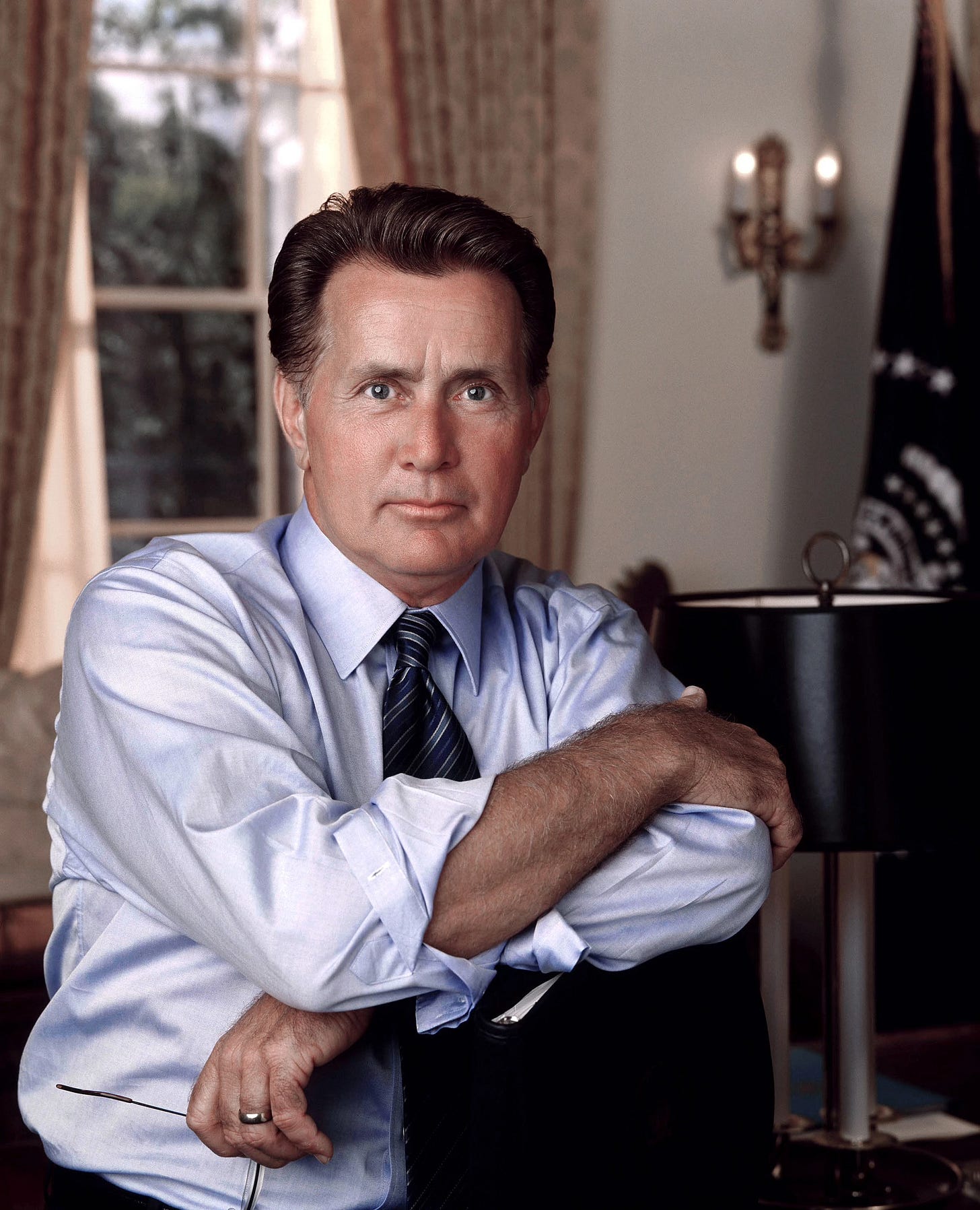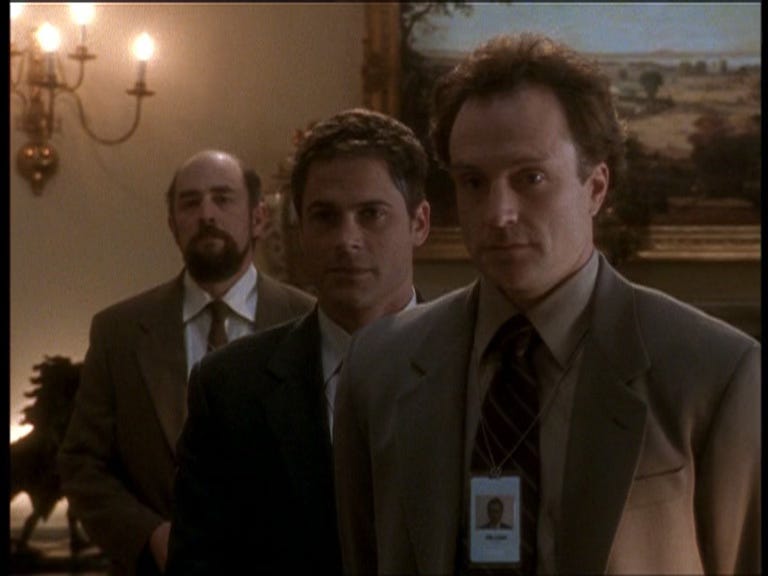Let Bartlet Be Bartlet: The West Wing Re-Watch, Part 1
Tracking my re-watch of The West Wing, focusing on the first six episodes of the long-running television show.
I always say that Mad Men is my favorite television show (and I’ll get back to that series and my re-watch of it soon, I promise). But I’ve got a Mount Rushmore, a Pantheon, a strata of excellent television shows in recent memory, and The West Wing, the Aaron Sorkin-helmed political drama that aired on NBC from 1999-2007, certainly belongs there.
I’ve begun re-watching the show (though, by the time I hit season five, it will be watching as I think that’s about as far as I got when I initially watched the show) and I’ll offer some thoughts as I go along. I’m not going to make the post-for-each episode approach like I’m doing in my Mad Men re-watch (given that The West Wing was on network television with 22 episode seasons, as opposed to Mad Men’s 13 episode seasons, writing on something on each episode doesn’t really seem feasible). I’ll be tackling batches of episodes at a time, trying to touch on each episode in some way.
I talked about how the Mad Men pilot is one of the best examples of a television pilot, but the pilot for The West Wing is right up there. I think about the ways in which our main characters—Sam, CJ, Toby, Leo, and Josh—are introduced sets us up for what we’re going to get for the rest of the series. Sorkin hits the ground running with his characters in that so much is communicated about them from the get-go. One very clearly grasps what these main figures are about and who they are (even if we don’t yet know everything about them and their history). It speaks to Sorkin’s vision that he understood these characters and what he wanted so early on in the show’s run.
Speaking of running… or walking… you get Sorkin’s famous device, the walk and talk, early on. It’s present in the pilot but in “Post Hoc, Ergo Propter Hoc” and “Five Votes Down” you really see that approach on full display. The “Five Votes Down” walk and talk is really remarkable and worth a second look.
But the first six episodes are all about setting up our characters for the rest of the series. There’s not much in the way of plot or story that will really factor into the larger narrative of the show (save for the introduction of Charlie Young as the President Bartlet’s body man and his eventually relationship with Zoey Bartlet). What happens is not as important as the time we spend with these characters and how we come to know them. Other, lesser programs would have to do so much work to get the viewer wanting to be immersed in the world of its characters, but the West Wing gets there from the beginning.
I’d forgotten about the focus on Rob Lowe’s Sam Seaborn and Laurie in those first episodes, which is a subplot that has not aged all that great. There’s also a great deal more of Moira Kelly’s Mandy, who leaves the show after the first season and always feels like a bit of a strange fit. I don’t think it’s a bad performance and having the more… cynical (?), media savvy figure there makes sense. But as it became clear that Donna was going to become this foil/love interest for Josh, the narrative reasons for having Mandy be there dissipated and she just doesn’t fit. It feels like, even as we continue through season 1, Sorkin and co. realize what the focus should be. It’s just worth noting that even in a show that gets off to such a great start there will still be missteps.
It’s also interesting seeing how Jed Bartlet, played perfectly by Martin Sheen, changes… not as a character but how his presence in the narrative begins to shift. It’s been covered already, but Sheen was only supposed to be on the edges of the show but the character (and what Sheen did to bring that character to life) could not just be left there. There’s such a range that he brings—the humor after taking the back pills in “Five Votes Down” the righteous anger in “Mr. Wills of Ohio” and “A Proportional Response;” the gravitas and warmth in “The Crackpots and These Women.” I think, when people comment that this show is a fantasy (especially for liberal, educated Democrats), it’s because of Bartlet, who seems almost too good to be real as a president. I’ll return to this idea of the show as a fantasy (and whether that’s a bad thing) later….
One character who I find myself wrestling with is Toby Ziegler. and the way he’s set up because he can be the most ideologically pure and certain figure and yet he’s also one who seems quite adept at playing the game of politics and knowing the kinds of compromises that one has to enact. Josh, beneath all his quips and charms, seems like the more ideological true believer while Toby seems so serious and yet there’s a tremendous amount of desire to win and succeed that makes him somewhat pragmatic. Toby, as a fellow writer (also a fellow balding, bearded guy) is someone who I connected with early on, along with Josh and Leo (ironically, the two lead billed actors—Rob Lowe and Moira Kelly—did not grab me in quite the same way).
From the beginning, I want to address a certain complaint about the show (which, yes, you do see early on)—that it’s a kind of fantasy for a certain kind of voter; namely, institutionalist liberal Democrats (who really became a core of the Obama coalition). I think it’s fair to identify that, but I don’t think it’s fair to use that as a reason to dismiss the show both as entertaining but also informative (?) and meaningful. We turn to tales of true fantasy for meaning and inspiration in our lives. We use them to uplift us, to grasp what is going on around us. There’s a reason Star Wars and Lord of the Rings and Marvel are all popular narratives. The West Wing is set in a world like ours, so we can’t allow for that “fantasy” to exist. There’s a distinction between inspirational and aspirational, and I think The West Wing falls on the inspirational side—it’s not what we aspire to (because, in so many ways, those things don’t exist) but it can inspire us to strive for the important things that we aspire to. Perhaps the world of the West Wing is something we should aspire to, but that might not be possible. But I think, no matter what, we can let it inspire us.
I’ll be continuing on with this series, thinking about a few episodes at a time and what’s going on within the larger narrative of the show. If you haven’t, go ahead and start a re-watch of this show (streaming on Max).



